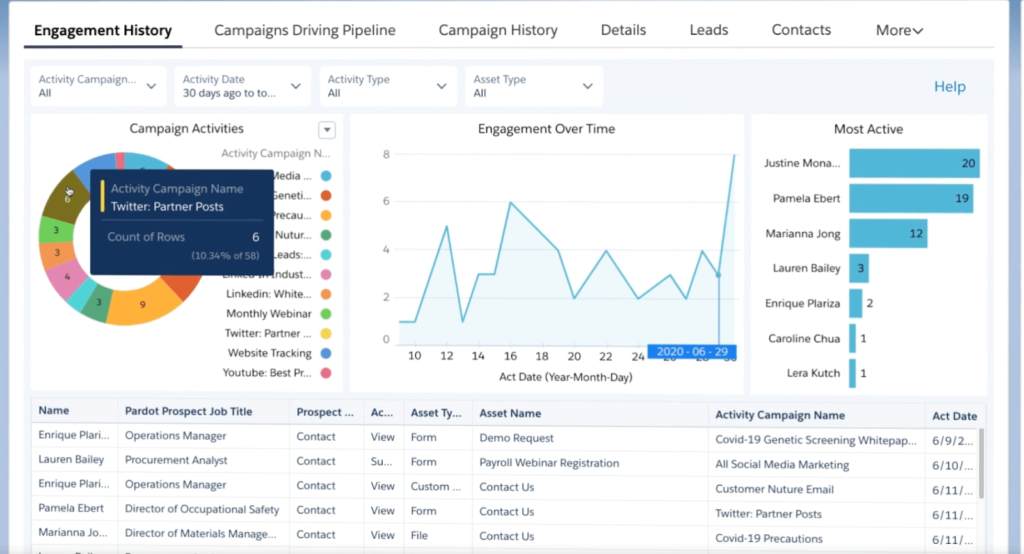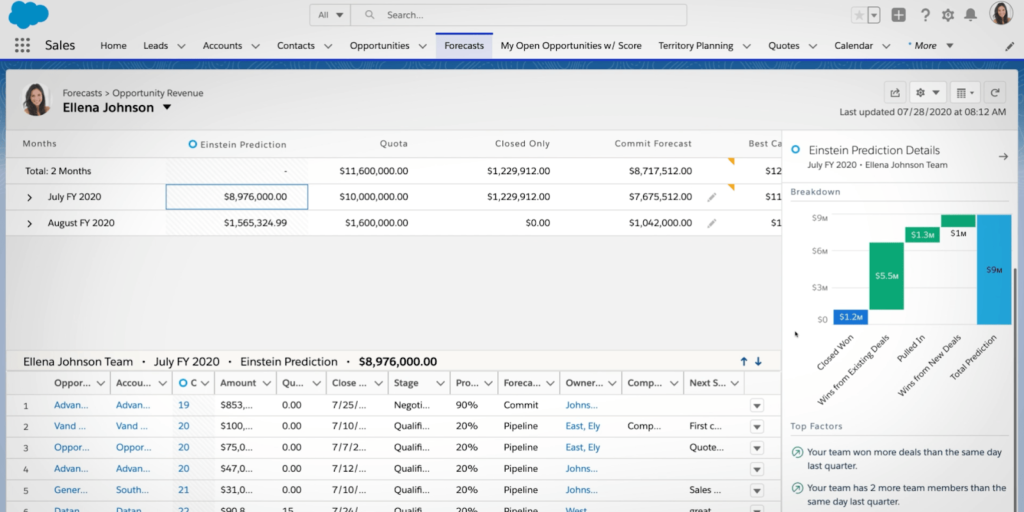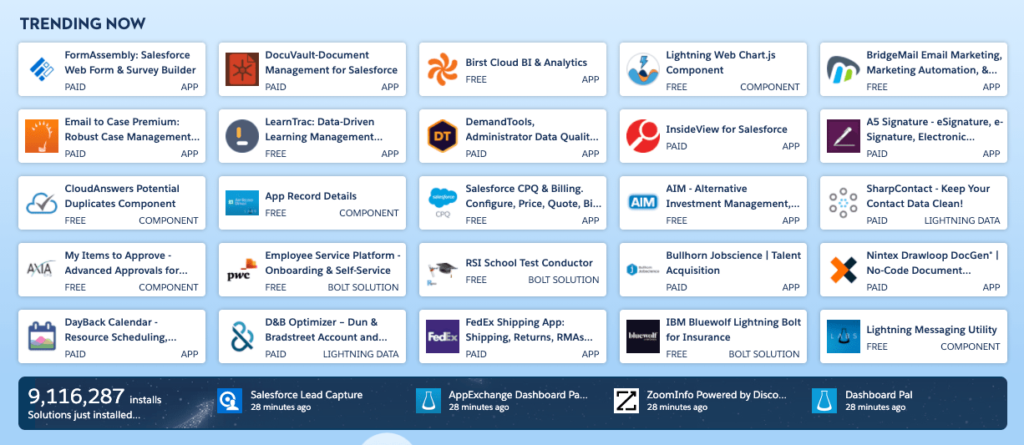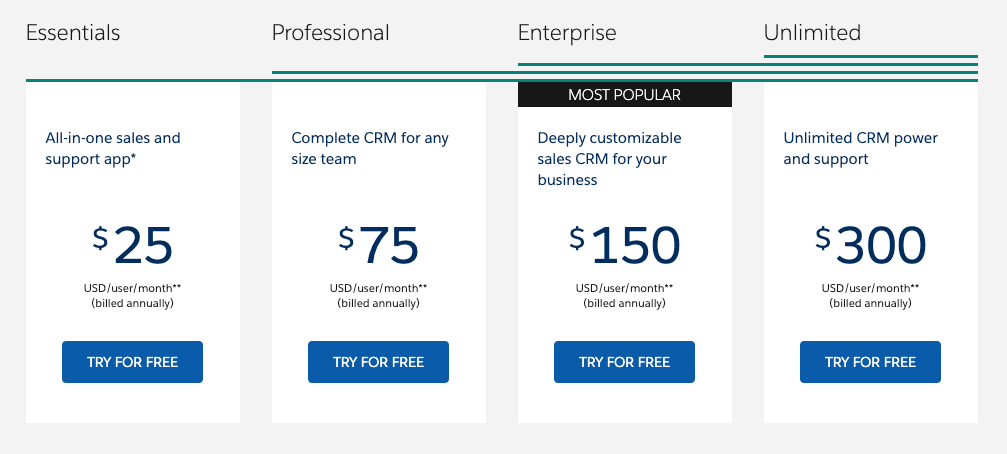Salesforce is one of those rare jacks-of-all-trade customer relationship management (CRM) software tools that actually masters everything. There’s a lot you can do in a single platform including sales, service, marketing, commerce, and IT.
But Salesforce isn’t just multifaceted—it’s also highly customizable and built with best-in-class technology.
That said, depending on your company’s size and sales volume, Salesforce can be go from empowering to overwhelming fast. How do you know if it will work for you?
I’ve taken the guesswork out of understanding Salesforce with this comprehensive review. I’ve boiled things down and explained the essentials you need to understand about this robust CRM tool.
Read on to learn everything you need to know to decide if Salesforce is right for your business.
Salesforce Pros and Cons
There’s lots to love about Salesforce. But it comes with some cons, too.
Pros
Salesforce does a lot of things really well and offers robust functionality.
- Fully cloud-based
- Mobile accessible
- Low-code customization
- Free training
- Built-in security
- AI-powered
- Very expandable
- Detailed analytics
Cons
But it isn’t perfect for every business. It is also:
- Relatively expensive
- Complicated to implement
- Offers inconsistent support
How Salesforce Compares to Top CRM Software
Used by over 150,000 businesses, Salesforce has been named the #1 CRM provider by IDC and recognized by Gartner as a leader in sales automation software. It’s among the most popular CRM software on the market.
It’s not unique. 80% of what Salesforce does can be done by its competitors: account management, organizing and storing data, simple tasks like creating quotes, order processing, and reporting.
It’s the other 20% that sets Salesforce apart—the advanced technology built for speed and business growth. While its competitors combine similar sales, marketing, and service solutions under one roof, where Salesforce differs is that it’s entirely cloud-based, making it easier to use on the go and with third-party products.
It’s also almost ridiculously extensible and generously customizable.
And it puts heavy emphasis on automation and predictive analytics, using artificial intelligence (AI) and machine learning (ML) to power a suite of tools it calls Einstein, which analyzes all your records to find trends, make predictions, and recommend next steps. Smart tracking helps you make sure no contact slips through the cracks, understand what deals need the most attention, and follow up at the right time.

Other CRMs have AI capabilities, too, but Salesforce by far packs the most power.
I won’t lie?—if you’re upgrading from spreadsheets and manual records, it’s easy to get overly excited about all the cool functionality you never knew existed.
But you don’t want to run the risk of buying more than you need or going in without a plan for fully leveraging what you buy. Research shows that most companies use less than a quarter of their CRM’s potential, and Salesforce is no different. A few caveats you should know:
- Salesforce can scale to accommodate any size business but can be cumbersome and too feature-rich for companies with low sales volume. This is a product best suited to mature sales organizations sending dozens of quotes a day.
- Implementation and adoption are the focuses of many complaints about the platform. Done right, you’ll get a lot of value out of Salesforce. Done wrong, the platform can be costly to manage, like a tool that’s dangerous in the wrong hands. You must have skilled admins and must be able to get your users jazzed about Salesforce for it to pay off.
- For newbies, the learning curve can be steep. Salesforce does offer a ton of free resources and certification opportunities—though some users say it’s quicker to get answers from Facebook groups or StackExchange.
If you’re looking for a no-frills CRM you can get started with quickly and use for just the basics, then Salesforce can quickly feel like more of a cost than an investment. In that case, I’d recommend a lighter-weight alternative like HubSpot, the top CRM we recommend for most people. You can see our review of Hubspot and seven other top CRMs here.
That said, if you plan to fully leverage Salesforce’s features and you have the dedicated resources to deploy them (more on that later when we talk about team size capabilities), then Salesforce is without a doubt a solid choice.
Remember, this isn’t just a CRM. When you buy Salesforce, you join a community of like-minded professionals committed to business growth and digital transformation and disrupting their industries. They are invested in the vision Salesforce is selling.
It’s like Peloton—not cheap, but you’re paying a premium to join a tribe.
Whether it’s worth the price tag to you hinges on whether you buy into the Salesforce vision and are committed to making the most of its capabilities to ensure return on investment and business growth.
Be realistic, and use the free trial if in doubt.
In the meantime, here’s an overview of the capabilities you should be looking at every time you evaluate a CRM and how Salesforce stacks up.
Salesforce Team Size Capabilities
Generally, the size of your business and team will have a significant impact on the CRM you choose. Even with tiered pricing for different sized companies, they tend to specialize in one area or another.
Salesforce does offer scalable solutions for teams of any size. But in my opinion, it makes the most sense for enterprises. Salesforce specializes in features that are most applicable to enterprise use cases, and I’d recommend HubSpot, for example, before I’d recommend Salesforce to small businesses with leaner resources.
As I mentioned earlier, dedicated admins are pretty much a prerequisite for implementing Salesforce. You 100% need someone on your team with the know-how to deploy its advanced features comfortably. And that means a sales expert, not an IT person who knows the tech but not how to optimize sales and marketing.
Salesforce can be learned, but for some teams, that learning curve is steep.
Salesforce CRM Capabilities
Some CRMs specialize in one category or another. Others combine capabilities into a single platform.
Salesforce takes the latter to an unmatched level. Name the CRM category, and Salesforce has it covered. If you can dream of a way to configure the platform, Salesforce can do it.

You can customize everything from your sales stages to email templates to the automation rules on any type of record (follow-up tasks, reminders, etc.). Edit your dashboard to reduce clutter, highlight what’s most important, and guide your sales team to the right actions. Slice and dice your data any way you can think of.
Speaking of reporting, this is another area where Salesforce dominates. It’s about as sophisticated as you can get when it comes to data visualization and sales forecasting.
And this is all under one roof. Salesforce was built to become your single source of truth for every category of CRM.
Salesforce Integrations
It’s essential to look for CRM software that integrates with the tools and systems you’re already using, and for many Salesforce users, this is where the rubber really hits the road.
In its integration marketplace, AppExchange, you’ll find thousands of pre-integrated apps you can install into your SF environment to enhance it with more advanced capabilities or streamline operations. It has everything from Outlook/Gmail plugins to automatically log emails and meetings to QuickBooks for expense management to enterprise resource planning platforms like SAP.

AppExchange even offers access to Salesforce consulting partners who can help set up these integrations.
And because all Salesforce products are based in the cloud, it integrates seamlessly with your apps and syncs your data in real-time, so all your systems stay up to date.
Salesforce Pricing
Like most CRMs, Salesforce bills per user, ranging from $25 per user per month for the Essentials plan to $150 or $300 per user per month.

Compare this to HubSpot, whose base plan is free—and goes above and beyond what you’d typically get for free.
Or consider that the $150-per-user Enterprise edition is most comparable (in terms of features and capabilities) to the Microsoft Dynamics Customer Engagement Enterprise edition, which comes to $95 per user per month.
Still, the plans for Sales Cloud, its CRM product, are among the most extensive on the market. Even the Essentials and Professional plans are enough for most businesses and can be extended with add-ons like CPQ, Einstein, and Pardot, Salesforce’s B2B marketing automation solution.
I appreciate the lengths Salesforce goes to in letting you build your own bespoke solution.
If in doubt, definitely take the platform for a test drive—the free trial includes a sample of all features available and is accessible to anyone on your team.
Salesforce Customer 360
Now let’s get into the details of Salesforce’s suite of CRM products: Customer 360.
It’s called 360 because it’s designed to provide a complete 360-degree view of the customer. Salesforce is designed to service all aspects of the business with several products in one.
And it keeps all customer data—who they are, what they’ve purchased, recent interactions, deals in flight—easily accessible in one place across all the CRM categories you can think of. No need to hunt through multiple systems.
These categories make up solutions based on business type, role, industry, or need.
For the purposes of this post, I’ll focus on Salesforce’s products for three core CRM needs?, sales, service, and marketing, so you can compare these to other CRM platforms. Then I’ll give you a quick rundown of other products under the Customer 360 umbrella.
Sales: Salesforce Sales Cloud
Sales Cloud is, in my opinion, the best product that Salesforce offers. It oversees and optimizes all aspects of the sales process, from lead generation to follow-up, offering reminders and recommendations along the way.
Sales Cloud works by turning leads into accounts, contacts, or opportunities. “Opportunities” are the lifeblood of deals in Salesforce—they keep track of what contacts are involved in a deal, what role they play, what they’ve done, and what needs to happen next for the best chances of closing.
Meanwhile, Salesforce’s Einstein AI will track where a lead came from, score it, and use that to inform the next steps and the best time to action them. When a sales rep is ready to follow up with a lead, all the info needed is there.
And it eventually rolls up into sophisticated dashboards that allow users to do everything from creating custom forecasting reports to tracking team performance.
This all extends to Salesforce’s mobile application, making it easy to log, visualize, and share sales data between meetings or on the go.
Customer Service: Salesforce Service Cloud
For many companies, supporting customers over multiple channels—email, phone, SMS, or the web—can be challenging.
And consider that challenge can be multiplied by how many support cases you’re processing each day and across how many disparate systems.
This is a major problem Service Cloud solves well. Its emphasis on omnichannel communication helps you engage customers in their preferred channels. You can even build self-service customer portals and track and respond to any mention of your brand online.
Direct contact with customers is logged instantly. Service Cloud automatically routes issues to the best person or team by issue priority. And you can see all support cases and customer information in one place regardless of source.
The goal is to decrease the time to resolve each case, and what’s especially useful about Service Cloud is that it includes suggestions and automated responses for different outcomes.
Marketing: Salesforce Marketing Cloud
Marketing Cloud is Salesforce’s solution to building, tracking, and optimizing customer journeys.
You can even create content directly within Salesforce through its various creation studios, like Social Studio, to draft, schedule, analyze social posts, and Email Studio to create and send email blasts.
B2B marketing automation is made possible through Salesforce Pardot, an application that combines sales and marketing data in one portal to align sales and marketing for better decision making.
For example, marketing can measure their impact on revenue and better allocate budget with valuable insights into deals—which leads are most likely to buy, what content was most helpful, and what else it took to close the deal.
That’s the point of all Salesforce products—to interact seamlessly with each other for better collaboration and decision-making.
Other Salesforce Products
You can further build out your bespoke solution with any combination of the other Customer 360 services:
- Commerce Cloud: Cloud-based commerce solutions for B2B and B2C
- Analytics Cloud: Powerful insights from any data in your CRM workflow
- MuleSoft: A leading integration platform and a code-free way to connect apps and data to Salesforce quickly and easily
- Platform: Salesforce’s platform-as-a-service (PaaS) solution for building and testing cloud applications
- Work.com: A Covid response solution to reopening quickly and safely
- Trailhead: A gamified learning experience platform built right into Salesforce that helps users build marketable skills
- Salesforce Anywhere: Real-time alerts and collaboration tools for sales and service teams
- Success Plans and Advisory Services: Plans for different levels of support from category experts
Conclusion
Salesforce is a robust solution we’d recommend to most companies, but it’s not for every company. If you’re a business with complex sales, marketing, and operations needs, the price premium is worth it. Otherwise, it might be too expensive to implement, maintain, and pay for annually. Unless your sales org can make use of its advanced features or community resources, look for something easier to run with out-of-the-box, like HubSpot.

